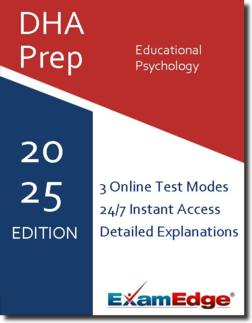DHA Educational Psychology (DHA-EducPsyc) Practice Exams & Test Prep Questions - Topics
Based on 25 Reviews
- Real Exam Simulation: Timed questions and matching content build comfort for your DHA Educational Psychology test day.
- Instant, 24/7 Access: Web-based DHA Educational Psychology practice exams with no software needed.
- Clear Explanations: Step-by-step answers and explanations for your DHA exam to strengthen understanding.
- Boosted Confidence: Reduces anxiety and improves test-taking skills to ace your DHA Educational Psychology (DHA-EducPsyc).

Understanding the exact breakdown of the DHA Educational Psychology test will help you know what to expect and how to most effectively prepare. The DHA Educational Psychology has 70 multiple-choice questions The exam will be broken down into the sections below:
| DHA Educational Psychology Exam Blueprint | ||
|---|---|---|
| Domain Name | % | Number of Questions |
| Data-Based Decision Making | 35% | 25 |
| Research-Based Academic Practices | 12% | 8 |
| Research-Based Behavioral and Mental Health Practices | 16% | 11 |
| Consultation and Collaboration | 12% | 8 |
| Applied Psychological Foundations | 13% | 9 |
| Ethical, Legal, and Professional Foundations | 12% | 8 |


